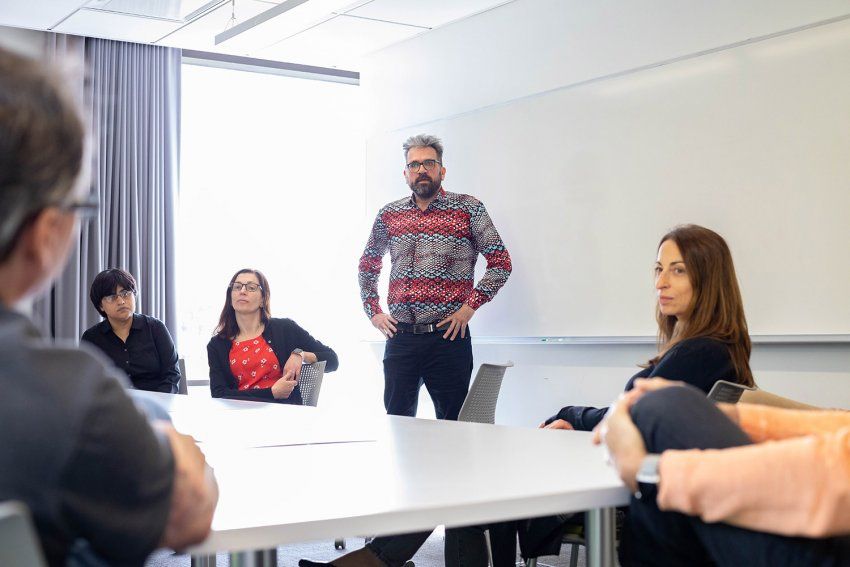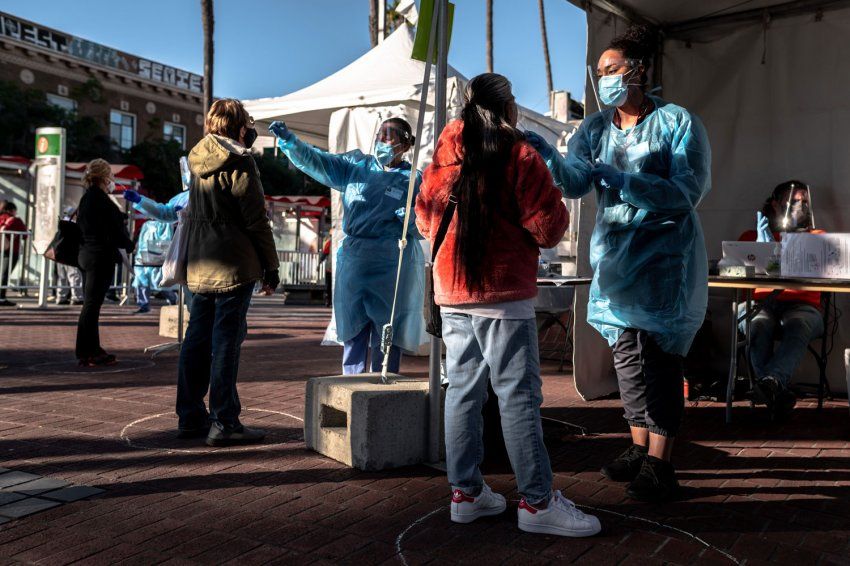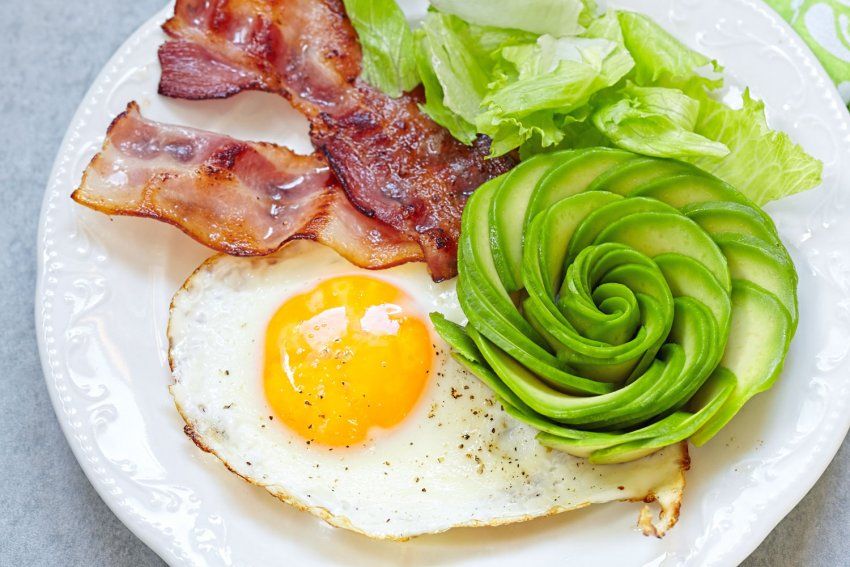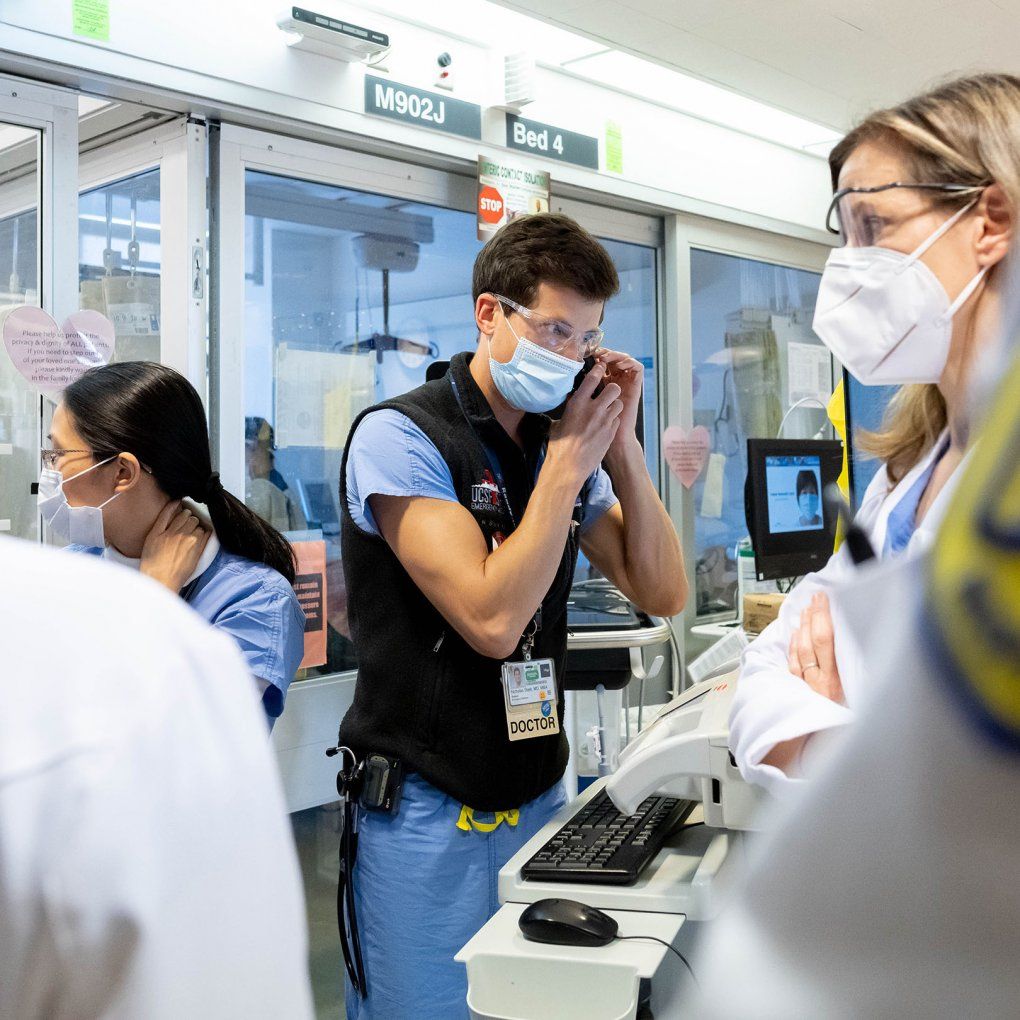Our Most Popular (Yes, Mostly COVID-19) Science and Health Stories of 2020
Every December, we take a look back on the year’s most popular science and health stories, usually a colorful mix of cutting-edge research, life-changing cures, and science for healthy living. But 2020 was a year unlike any other, and it is no surprise that COVID-19 stories dominated our headlines and attention.
From our early stories on the spread of the mysterious new virus, to updates on testing, therapies, and face masks, to our latest look-ahead on vaccines just around the corner, they reflect the UC San Francisco community’s hard work and dedication throughout the year.
We present these stories in the order they happened – a chronicle of this extraordinary year.
January - March

Nevan Krogan (center), PhD, talks with the QBI COVID-19 team. Photo by Susan Merrell
In late January, an infectious disease expert told us that the mysterious new virus spreading in China was “definitely something to worry about.”
By February, the disease caused by the new coronavirus had a name – COVID-19 – and we were beginning to understand how it spreads and progresses, and why one test may not be enough. Hospitals prepared for rising cases and people were advised to wash their hands and to call their doctor if they felt sick.
On March 11, the World Health Organization declared COVID-19 a pandemic and Bay Area counties rolled out stay-at-home orders. Epidemiologists, foreseeing an overburdened health care system, urged everyone to practice social distancing to flatten the curve, including young people without symptoms, who can still transmit the virus.
In the lab, researchers began mapping how the coronavirus hijacks human cells, and a psychologist offered tips on how to cope with COVID-19 anxiety.
Most Popular
• As Mysterious Coronavirus Spreads, An Infectious Disease Expert Explains What You Should Know | Read
• How the New Coronavirus Spreads and Progresses – And Why One Test May Not Be Enough | Read
• As Coronavirus Spreads, Experts Explain When to Call a Doctor, How Testing Works and More | Read
• Why Experts Are Urging Social Distancing to Combat Coronavirus Outbreak | Read
• Coronavirus Is Sickening Young Adults and Spreading Through Them, Experts Say | Read
• Unveiling How Coronavirus Hijacks Our Cells to Help Rush New Drugs to Patients | Read
• Feeling Anxiety About Coronavirus? A Psychologist Offers Tips to Stay Clearheaded | Read
April - June
On April 3, the Centers for Disease Control and Prevention officially recommended that people start wearing face coverings in public, so we asked an emergency care doctor to show us how to properly don different face masks.
As cases of COVID-19 skyrocketed in epicenters like New York City, there was new interest in tests that could identify people who may have gained immunity to the virus after infection. But our experts were cautious about the promise and uncertainties of antibody testing for COVID-19 and found high false positive rates when evaluating some of the new antibody test kits on the market.
Other researchers focused on COVID-19 risk among different populations, studying how COVID-19 could affect pregnancy or confirming the link between smoking and more severe COVID-19.
Amid so much bad news, glimmers of hope emerged in May with modestly encouraging results from early trials of the antiviral drug Remdesivir, even though the drug was not yet FDA-approved and hard to come by.
By June, five months into the pandemic, it became clear that some 45 percent of people with COVID-19 were asymptomatic but still infectious. Yet confusion over masks continued, so we asked our experts to break down the science behind how face masks prevent COVID-19 – which became our most read story of the year.
Most Popular
• Emergency Care Doctor Explains When to Wear a Face Mask, How to Do It the Right Way | Read
• The Promise and Uncertainties of Antibody Testing for Coronavirus | Read
• What We Know and Don’t Know About Coronavirus and Pregnancy | Read
• Smoking Nearly Doubles the Rate of COVID-19 Progression | Read
• Antiviral Drug Remdesivir Can Help Fight the Coronavirus, But Can Patients Get It? | Read
• Still Confused About Masks? Here’s the Science Behind How Face Masks Prevent Coronavirus | Read
July - September
As summer arrived, the more we learned about COVID-19’s effects on the body, the more we realized that it’s not just a respiratory virus. The virus can attack not only the lungs, but also the heart, gut, and brain, and cause strange symptoms like loss of smell or “COVID toes.”
Meanwhile, researchers were engineering a llama-inspired inhalable antiviral, called Aeronabs, that they hoped would provide temporary protection against COVID-19 infection.
But with vaccines still elusive, an infectious disease expert explained that face masks were still our best protection and that masks not only protect others but also the wearer.
By September, doctors worried about an impending “twindemic” in the fall and winter urged people to get a flu shot this year, and warned that you can’t always tell the flu and COVID-19 apart.
Most Popular
• We Thought It Was Just a Respiratory Virus. We Were Wrong. | Read
• ‘AeroNabs’ Promise Powerful, Inhalable Protection Against COVID-19 | Read
• One More Reason to Wear a Mask: You’ll Get Less Sick From COVID-19 | Read
• Why COVID-19 Means You Need a Flu Shot This Year | Read
• Can You Tell If It’s the Flu or COVID-19? Doctors Say It’s Not So Clear | Read
October - December

Mission residents are swabbed at a pop-up COVID-19 test site at the 24th Street BART Station. Photo by Mike Kai Chen
By fall, months-long studies on the coronavirus were yielding results. In October, the first report from a long-term study of pregnancy and COVID-19 found that a quarter of pregnant women had prolonged symptoms. An initiative that provided free COVID-19 testing in the Mission district of San Francisco showed that rapid tests could identify the most infectious individuals.
And UCSF’s expertise in COVID-19 was recognized on the national stage. In November, after a tumultuous election season, President-elect Joe Biden and Vice President-elect Kamala Harris appointed three UCSF faculty to their coronavirus advisory board.
At year’s end, 11 months into the pandemic, the country faced both a grim winter and hope on the horizon. Experts offered advice on minimizing risk during the holiday season as a dangerous third wave of infections arrived. And, with several vaccines nearing approval, our experts explained how we’ll know when a COVID-19 vaccine is safe.
Most Popular
• COVID-19 Has a Prolonged Effect for Many During Pregnancy | Read
• Rapid COVID-19 Test Shows Promise in Community Test Setting | Read
• 3 UCSF Faculty Named to Biden-Harris Transition COVID-19 Advisory Board | Read
• Holiday Gatherings During COVID-19: What Doctors Say About Traveling and Family Events | Read
• How Can We Be Sure the New COVID-19 Vaccines Are Safe? | Read
Non-COVID-19 Stories that Caught Your Attention

While the novel coronavirus dominated the news in 2020, stories about keto diets, nicotine in e-cigarettes, and a protein that confers the cognitive benefits of exercise still engaged our readers.
Most Popular NON-COVID-19 Stories
• JUUL Delivers Substantially More Nicotine than Previous Generation E-Cigs and Cigarettes | Read
• Five Years After Abortion, Nearly All Women Say It Was the Right Decision, Study Finds | Read
• Ketogenic Diets Alter Gut Microbiome in Humans, Mice | Read
• Brain Benefits of Exercise Can Be Gained with a Single Protein | Read
• Drug Reverses Age-Related Mental Decline Within Days | Read

Year in Review
Amid the challenges of 2020, the tenacity of the UCSF community has allowed us to shine.